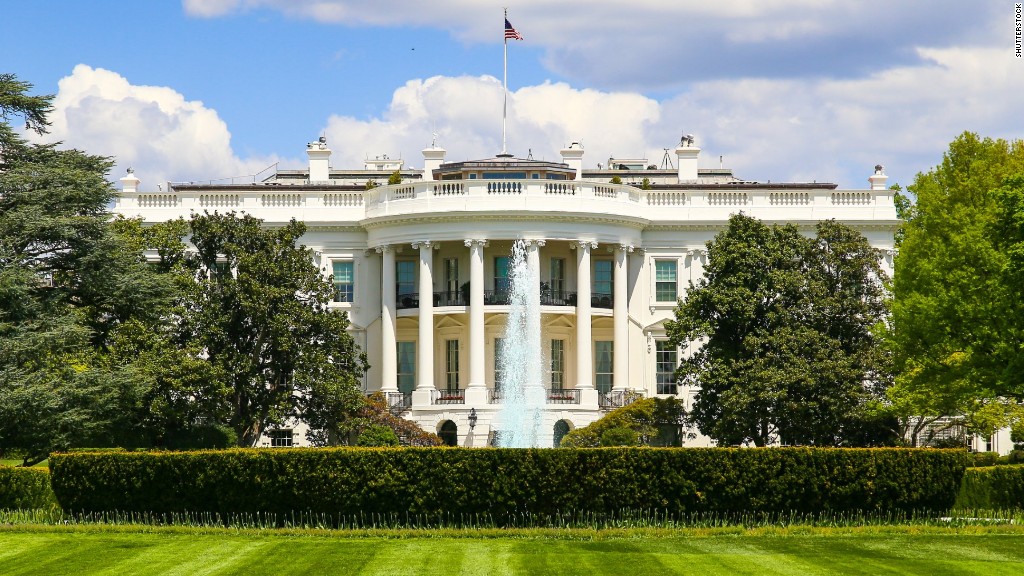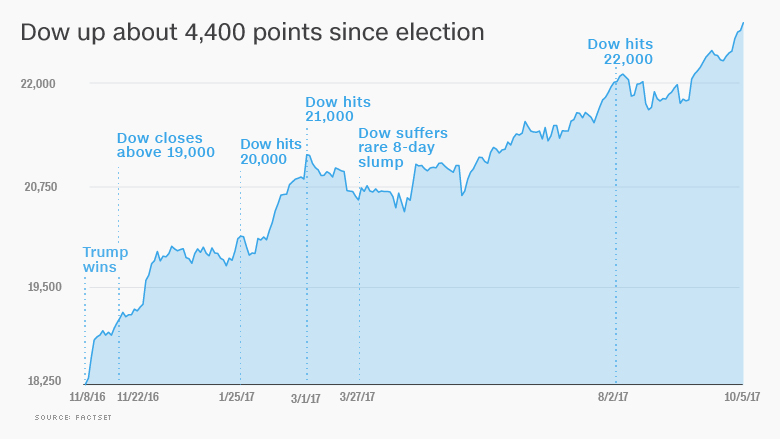
Wall Street is very, very excited about President Trump's promise to slash corporate taxes.
Investors are betting that the GOP tax plan will create a bonanza for Corporate America that will vault the red-hot stock market into the stratosphere. The Dow has already hit 63 record highs since Trump's victory last November.
But euphoria may be overdone, if not misplaced entirely.
Yes, reforming the tax code is long overdue. And cutting the corporate tax rate from 35% to 20% would save companies billions.
But the U.S. economy may not need that much help right now, especially if it's paid for by adding to the budget deficit. After all, the unemployment rate fell in September to a 16-year low of 4.2%.
"The U.S. economy does not need any fiscal stimulus here. It could be too much of a good thing," said Ed Yardeni, president of investment advisory Yardeni Research.
Already, the relentless pace of gains on Wall Street has raised concern that the market could be on the cusp of a "melt up" -- an unsustainable rally that isn't supported by fundamentals. CNNMoney's Fear & Greed gauge of market sentiment is sitting in "extreme greed" mode.
Fiscal stimulus like a big corporate tax cut could fuel a bubble in the stock market, David Kelly, chief global strategist at JPMorgan Funds, warned in a recent research report.
This help from the federal government would also leave Washington with less ammo to boost the economy should it falter again soon.

Related: The Dow is so hot that it could melt
It's worth noting that Trump wants to add stimulus just as the Federal Reserve is doing the opposite. Citing the strong jobs market, the Fed recently announced plans to begin unloading the enormous portfolio of bonds it bought during the Great Recession to support the economy.
"Only a fool would step on the brake and the gas at the same time," Kelly wrote. "Only a fool or Washington, that is."
Needed or not, Trump's tax plan may be paid for by adding to America's mountain of debt. The Tax Policy Center estimates that the tax framework would slash federal revenue by $2.4 trillion over 10 years and $3.2 trillion over the second decade.
With the United States already $20 trillion in debt, additional deficit spending may make bond investors nervous.
A selloff in bonds would lift Treasury rates from their historic lows, and that would be bad news for stocks. Ultra-low bond rates have forced investors into risky assets like stocks, and higher Treasury rates make stocks look less attractive by comparison.
"If bonds start to protest the outlook for the U.S. budget deficit, that could create problems," said Yardeni.
Dallas Fed President Robert Kaplan told CNBC he would be "leery" of a tax cut that is financed by increasing the deficit.
"My concern is you get a short-term bump" that would leave the economy "more leveraged," he said.
GOP leaders have sought to ease concerns about the deficit by arguing that lower tax rates would boost economic growth enough to offset the loss of tax revenue.
Those claims are extremely optimistic and rely on growth that may never happen. Even if it did, the Fed would be forced to raise interest rates more quickly to prevent the economy and inflation from overheating.
"The market's done extremely well with the economy growing at a leisurely pace of 2%, inflation staying low and bond yields at 2%," Yardeni said. "Any radical change could cause problems for the market."
Related: Conservatives hate deficits...except to pay for tax cuts
Of course, there is a good chance the GOP tax framework will get adjusted, perhaps significantly. There's also no guarantee any tax cuts get through Congress, especially given Trump's Twitter fights with GOP senators whose support he needs.
And even though the economy is doing well, the tax code could be used to make it do better.
For instance, the GOP tax plan would allow companies to immediately write off, or expense, the cost of new investments. The goal is to encourage companies to finally spend big money on factories and other job-creating programs.
"That's very powerful," said Kristina Hooper, global market strategist at Invesco. "The consumer has been driving this recovery for years. It might not be a bad thing to see corporate spending shoulder the load."
One caveat: This expensing provision would last only five years, limiting its stimulative effect.
But the GOP tax plan would do little to fix the jobs-skills mismatch that is holding the economy back. Employers have struggled to find enough skilled workers to fill vacant positions, leaving the country with a record number of job openings.
"This is a situation that will only get worse over time as we see innovations like driverless cars that cause the loss of jobs," said Hooper.


